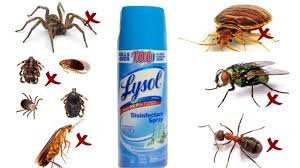It’s late at night. You spot a roach scurrying across the kitchen floor, and the only thing within reach is a can of Lysol disinfectant spray. Without thinking, you grab it and spray. The roach twitches, slows down, and maybe even flips over. For a moment, it feels like victory. But does Lysol actually kill roaches, or is it just giving you a false sense of success?
Many homeowners swear by using cleaning sprays as quick pest control. The truth, however, lies somewhere between science and myth. Let’s break down what really happens when you spray Lysol on a roach, why it appears to work, and why it may not be the best long-term solution.
Read also: How to Personalize Every Room in Your Custom Home: Unique Design Ideas
Why People Try Using Lysol to Kill Roaches
The reason people reach for Lysol instead of insecticide is simple—it’s convenient. It’s already sitting in the bathroom or under the kitchen sink. When a cockroach appears unexpectedly, most people don’t have roach spray ready, so they grab whatever aerosol can they find.
There’s also the assumption that because Lysol kills germs and viruses, it must kill bugs too. The logic sounds reasonable, but the biology of a cockroach is far different from bacteria on a countertop.
The Problem – Quick Fixes Create False Confidence
The main problem with using Lysol disinfectant as a roach killer is that it gives a false sense of control. When you spray a roach, it may slow down or even appear to die. But that doesn’t necessarily mean the product worked as intended.
In most cases, the roach is simply immobilized because the spray coats its breathing holes, or spiracles. These tiny openings along its body allow it to breathe. When Lysol’s alcohol-based formula clogs them, the roach temporarily suffocates—but not always fatally.
The Solution – Understanding What’s Actually Happening
When you spray Lysol on a roach, several reactions occur:
- Suffocation: The liquid covers the insect’s body, blocking air intake.
- Chemical irritation: Ingredients like ethanol and isopropanol burn or irritate the roach’s exoskeleton.
- Desiccation: The alcohols and surfactants dry out the roach’s waxy coating, causing dehydration.
These effects can kill smaller roaches, but larger adults often survive. What looks like death might just be temporary paralysis or shock. Within hours, the roach can recover and crawl away to hide.
What Actually Happens When You Spray Lysol on a Roach
Lysol wasn’t made for pest control. It’s designed to disinfect surfaces by breaking down the outer membranes of microbes. Roaches, on the other hand, have hard shells, complex respiratory systems, and the ability to hold their breath for minutes at a time.
So when you spray Lysol, you’re not poisoning them—you’re overwhelming their bodies temporarily. The roach’s nervous system reacts to the harsh chemicals, which can cause twitching or stillness, but not always death.
In scientific terms, the alcohol-based components in Lysol lack the residual toxicity that real insecticides have. Professional roach sprays are designed to enter the insect’s system and disrupt its nerve signals, ensuring it dies completely. Lysol doesn’t have that kind of potency.
The Problem – Disinfectants Aren’t Designed as Pesticides
There’s a dangerous misconception that “if it kills germs, it kills everything.” In reality, disinfectants like Lysol target microorganisms, not insects. Germs are single-celled organisms, while roaches are complex creatures with multiple defense mechanisms.
Using household cleaning sprays for pest control can also cause harm in other ways. The chemicals may damage surfaces, irritate your skin, or release fumes unsafe for pets and children. More importantly, it can create a false belief that the problem is solved—when in fact, roaches are hiding nearby and breeding.
The Solution – Science-Based Pest Control
If you’re trying to deal with roaches effectively, you need to understand how they live. Roaches thrive in hidden areas—behind appliances, under sinks, and inside cracks where sprays like Lysol can’t reach.
Instead of using disinfectant sprays, focus on methods that target the source:
- Boric acid: Harms roaches internally when they ingest it.
- Gel baits: Attract roaches and poison them through food contact.
- Traps and sticky pads: Help monitor activity levels.
- Deep cleaning: Removes crumbs and grease that draw them in.
These strategies work with the biology of roaches, not against it, providing a long-term fix instead of a momentary victory.
Can Lysol Kill a Roach, or Does It Just Repel Them?
In some cases, Lysol spray may kill a roach—especially if sprayed directly and in large amounts. However, most of the time, it only repels them. The strong scent and alcohol concentration make the environment uncomfortable, causing roaches to scatter rather than die.
So, yes, Lysol can harm or repel a roach, but it’s not a guaranteed killer. Think of it as a temporary deterrent, not a reliable solution.
The Problem – Misleading Myths and Online Advice
Online hacks often make Lysol sound like a miracle fix, but these claims lack scientific proof. The danger lies in people skipping proper pest control because they believe myths spread through social media.
Another issue is inconsistency. Every Lysol variant—whether lemon-scented, disinfectant spray, or bathroom cleaner—has a slightly different chemical mix. That means one might seem more effective than another, but none are true pesticides.
The Solution – Knowing When to Use What Works
Instead of relying on viral cleaning hacks, it’s better to use evidence-based methods. Save Lysol for sanitizing surfaces and switch to professional-grade roach control for infestations.
If you must act fast and have nothing else, spraying Lysol can buy time by slowing down a roach. But afterward, clean the area thoroughly, seal cracks, and place bait traps. Treat Lysol as a stopgap—not a solution.
The Science Behind Roach Resistance
Cockroaches are survivors. They’ve existed for over 300 million years, adapting to poisons, environments, and even radiation. Their outer shell, called the exoskeleton, is made of chitin—a strong material that resists most household chemicals.
They also breathe through tiny openings, meaning they can survive without oxygen for short periods. So while Lysol’s ingredients can irritate them, it rarely kills them instantly. True insecticides are engineered with compounds that bypass these defenses and disrupt their internal systems.
The Problem – Short-Term Fixes, Long-Term Infestations
Spraying Lysol may help you kill one roach, but it won’t touch the nest. Roaches reproduce quickly, and even one surviving female can restart an infestation. Homeowners often underestimate how many are hiding out of sight.
Focusing on surface-level control instead of addressing the source keeps the problem alive. That’s why Lysol, while convenient, doesn’t solve the real issue.
The Solution – Combining Prevention With Control
For long-term relief, combine cleanliness with targeted pest control:
- Seal entry points around doors, drains, and pipes.
- Store food in airtight containers.
- Empty trash regularly.
- Use bait stations in dark, moist corners.
- Schedule deep cleaning once a week.
By addressing the causes—food, shelter, and water—you remove the conditions that attract roaches in the first place.
Conclusion
When you spray Lysol on a roach, what happens is more chemistry than magic. The disinfectant can suffocate or irritate the insect, sometimes even killing it, but it’s not designed for pest control. It may repel or temporarily disable roaches, but it won’t stop an infestation or reach hidden colonies.
The myth that Lysol kills roaches outright comes from coincidence, not consistent science. Real success comes from understanding how roaches survive—and using proven, targeted methods to outsmart them.
So next time you grab that disinfectant, remember: cleanliness matters, but smart pest management wins the war.




